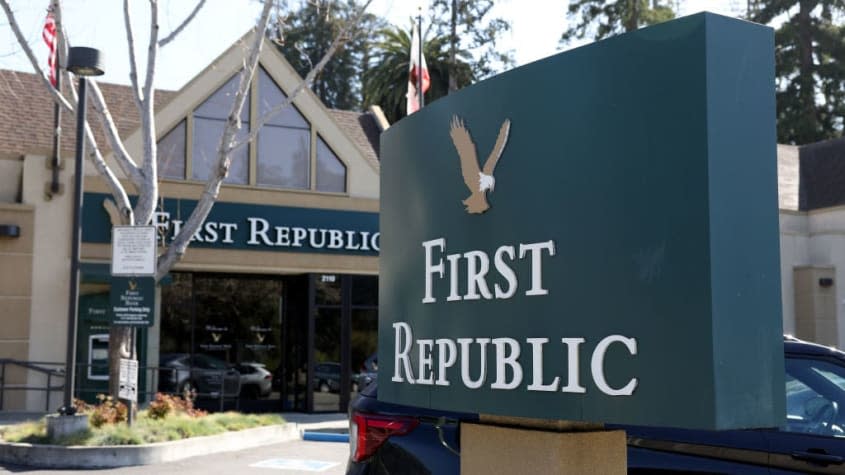Regulators seize First Republic Bank, sell JPMorgan 'substantially all' remaining assets

- Oops!Something went wrong.Please try again later.
The Federal Deposit Insurance Corp. took over the troubled San Francisco-based First Republic Bank early Monday and sold "substantially all" of its assets to JPMorgan Chase, the FDIC said in a statement. First Republic's 84 branches in eight states will open Monday morning as JPMorgan branches, and customers will have full access to their deposits. First Republic had been teetering since the collapse of Silicon Valley Bank and Signature Bank sparked a run on deposits, and federal regulators had scrambled over the weekend to find a buyer before the start of business on Monday.
"Our government invited us and others to step up, and we did," JPMorgan CEO Jamie Dimon said in a statement. First Republic's sale involved a "highly competitive bidding process," the FDIC said, though the final sale price was not disclosed. JPMorgan will assume all of First Republic's $96 billion in deposits, insured and uninsured (above the FDIC limit of $250,000), and most of its assets, including roughly $173 billion in loans and $30 billion in securities, The Wall Street Journal reports.
The FDIC said First Republic's failure will cost it about $13 billion from its insurance fund, and JPMorgan said it would receive $50 billion in financing from the FDIC. Eleven of the country's largest banks, including JPMorgan, threw First Republic a $30 billion lifeline in March, allowing it to limp along for weeks after SVB and Signature collapsed and First Republic lost $100 billion in deposits.
First Republic's seizure and sale marks the second-biggest banking failure in U.S. history, following the collapse of Washington Mutual in 2008, the Journal reports. Dimon's JPMorgan, the largest U.S. bank, bought the remains of Washington Mutual as well. "Many banking experts said First Republic's travails were a delayed reaction to the turmoil in March rather than the opening of a new phase in the crisis," The New York Times reports. "As First Republic's stock plunged anew last week, other bank stocks barely budged."
"This is the last stages of that initial panic" that "started as a result of SVB and Signature," Steven Kelly, a senior researcher at the Yale Program on Financial Stability, tells the Journal. "This isn't the story of 2008, where one bank went down and investors focused on the next biggest bank, which would wobble."
You may also like
Stanley Tucci reflects on his 'terrifying' oral cancer battle
Air pollution could increase risk of heart arrhythmia
The Super Mario Bros. Movie becomes 1st film of 2023 to gross $1 billion

